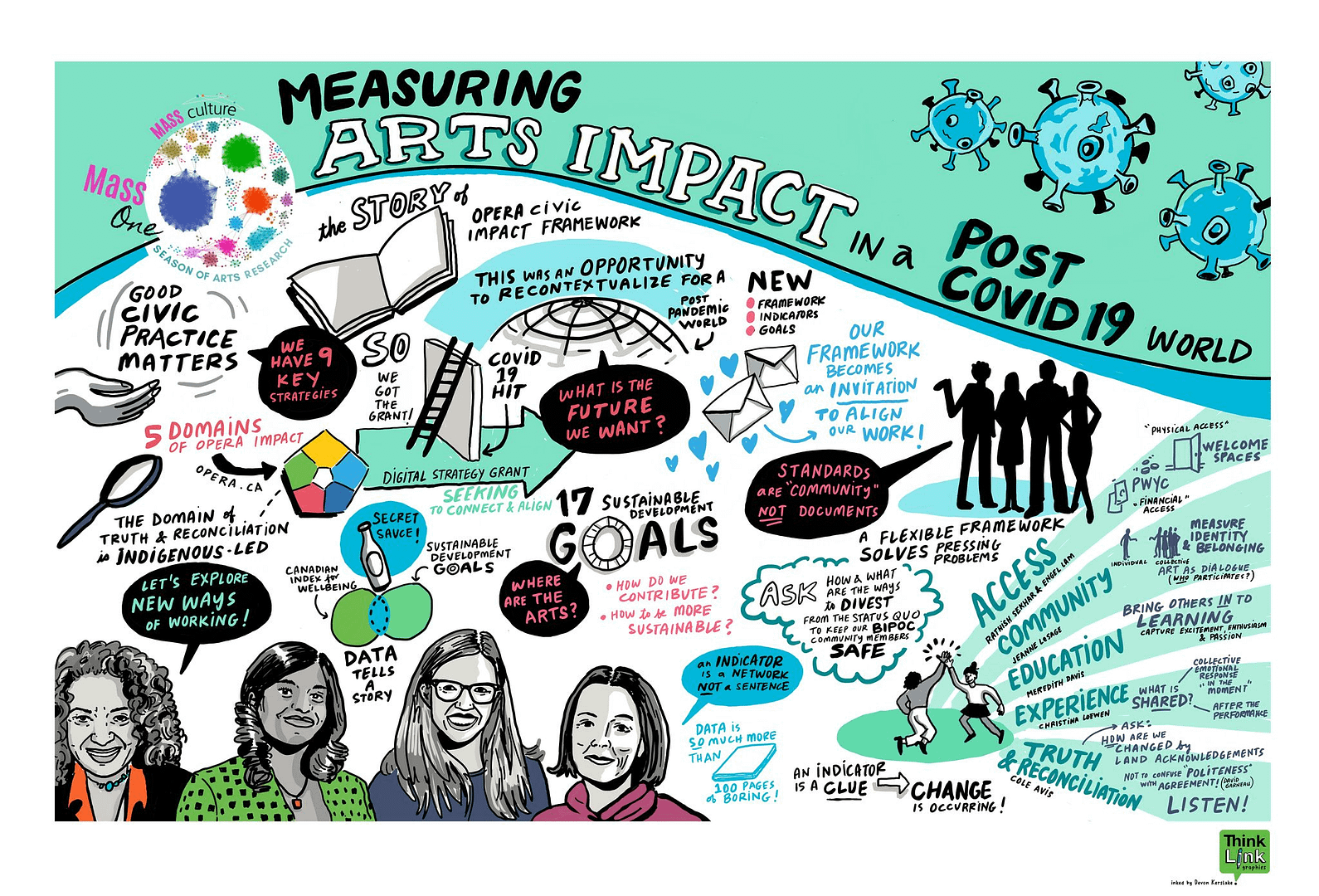
In September 2017, I was Artist-in-Residence at Pacific Opera Victoria (POV), halfway through a year-long engagement with this small but mighty opera company. I was fortunate to be embedded at POV at a time when they were commissioning new works, developing a new strategic plan, and contributing to emergent conversations in the sector (facilitated by our national association, Opera.ca) around civic impact. I attended my first Opera.ca colloquium that year, called Designing Civic Impact in Opera. This is where I first met Christina Loewen, Executive Director of Opera.ca and co-host of the recent Mass One Study Date: Civic Impact Frameworks.
Working in opera means thrilling opening nights, full orchestras, dozens (if not hundreds) of performers on stage. My formative period at Pacific Opera Victoria included all of this: beautiful music and gorgeous costumes, all the swoon-worthy frills of our beloved artform. And yet, whenever someone asks me about my time there, I end up speaking about strategic planning and civic impact.
I’m drawn to the MBA-meets-board-meeting buzz words because they matter to me. If opera is the what, strategic planning and civic impact are the how and the why.
According to Merriam-Webster: civic = of or relating to a citizen, a city, citizenship, or community affairs.
If what we do in the opera house has no relation to the lives of local citizens if the affairs of the community are not showcased and debated on our stages then frankly, I’m not interested.If our habit (in ordinary circumstances) is to convene and tell stories to thousands of citizens, we have a deep responsibility to prepare and evaluate what we do as civic impact.
If what we do in the opera house isn’t deliberate, if it isn’t holistically strategic, then instead of celebrating the kind of risk that lifts us to greater heights, we risk falling into that unfortunate chasm between intention and impact.
This is why currently, justifiably, as individuals and as an industry, we are being called to account. The opera sector – in which I wholly include myself – has been complicit in perpetuating systemic racism and other inequities that shape our lived realities. Some of us have benefitted from this, while others have suffered, and continue to suffer.
Over the past four centuries, opera has proven what can be achieved when we are creative and united in common purpose. There have been sublime moments of human connection, of transcendence and transformation. At the same time, we have had a detrimental civic impact, perpetuating divisions and ‘othering’ through insensitive, oppressive, exclusionary narratives, both on stage and off.
Bias has played a central role in this, and until very recently, we also lacked effective tools by which to evaluate our impact, particularly with respect to qualitative measurements, like a sense of belonging, or effects on one’s self-esteem. At the 2017 Opera.ca colloquium,I witnessed how this was beginning to change.

A National Conversation
I registered to attend Mass One Study Date: Civic Impact Frameworks because I was eager to pick up the conversation begun 3 years earlier. In January of this year, Opera.ca published its Opera Civic Impact Framework. It was heartening. I was looking forward to learning more about this framework, particularly which tools were being used and recommended for measurement, and how we might connect across disciplines to share what works (and what doesn’t). What’s more, I was hoping to add strategies and vocabulary to my toolkit, so that I might become a stronger advocate for centering civic impact. Since late 2019, I have been in residence at the Canadian Opera Company (COC) as a Stage Director and Dramaturg. As one of our larger cultural institutions, the COC carries the hefty weight of tradition and is, admittedly, slow to respond meaningfully to change. And yet, what I have witnessed internally, and seen demonstrated through some actions externally, gives me hope. Our national opera company could, with sustained effort, emerge as a leader in civic action. I want to help make this happen.
Prior to attending the Mass One study date, we were provided with a video invitation from Christina Loewen. Within this, she referenced Simon Brault, Director of the Canada Council for the Arts, who urges us to “demonstrate that we have something meaningful to contribute beyond the creation and presentation of our artistic production alone. We have to show […] that the arts can contribute in a meaningful way to social cohesion, healing, sustainability and economic development.” I agree.
As is often the case when I connect with Christina and Opera.ca, I felt that I was entering a space in which I would be seen and heard, inspired and supported. I was reminded how grateful I am, for the ideating and advocacy that Christina undertakes on behalf of our sector. In addition, I was excited to hear her mention the “flexible measures” that would be discussed.
As qualitative, felt experiences are germane to civic impact, my hope was that we would explore a framework that was robust yet flexible. What is more, it was my expectation that we would learn about plans to digitize the framework, rendering it easier and faster for users to interact with available technologies to register their personal feedback on impact.
Even better, there were plans, I learned, to “scale it beyond opera and set it up for interoperability with national and global community impact frameworks such as the Canadian index of Well-being and the UN Sustainable Development Goals.” This vision resonated with me; it aligns with my personal framework (of artmaking as caretaking), and had the effect of making me more hopeful for our collective future. No small feat, given our current circumstances.
At the same time, I was uncertain about the format and general vibe of the 3-hour Zoom session: what could I expect in terms of co-learning, interactivity and connectivity (both human and technological)? Alongside this, I questioned my own capacity to remain meaningfully engaged for 3 hours consecutively on screen.
Within seconds of entering the Zoom room, dozens of faces and names were popping up on screen. Some were familiar – like my brilliant colleague Aria Umezawa, co-founder of Amplified Opera (www.amplifiedopera.com) – but most were new acquaintances. There were independent artists from a range of disciplines, cultural strategists, funders from municipal, provincial and federal levels, representatives from both small and large educational and artistic institutions, as well as guest speakers from academia and the private sector, who would share their own work in the realm of civic impact, specifically as it intersects with the Opera.ca framework. All these people, from across the country, were interested in civic impact?
If that’s the case, I thought, then surely a more inclusive and equitable future is possible. Particularly if we can amplify our individual impacts by harnessing our data and working together towards common goals. While I am accustomed to considering the generic ‘greater good’ of artistic practice, I had never thought to specify or activate this with reference to the UN’s Sustainable Development Goals. What if all opera producers in Canada decided to collaboratively and consciously craft their programming (and their company culture) in service of Goal #10: reducing inequality? What would it look like if, between 2020 and 2030, we committed ourselves to Goal #11: make cities inclusive, safe, resilient and sustainable?

Reframing our thinking
It wasn’t all rosy-eyed optimism, though. Hard, necessary truths were brought into the conversation by Michif (Métis) theatre artist Cole Alvis, who facilitated a breakout session on Truth & Reconciliation, later leveraging their opportunity to address all participants, calling our attention to the ongoing dehumanization and violence to Indigenous and Black bodies. Related to this, Christina acknowledged that while Truth & Reconciliation is one of five Civic Impact Theme Areas in the Opera.ca framework, positioning it on the same level as the other areas (Experience, Access, Education, Community) diminishes its urgency and import. Given the ways in which measurable data are central to creating and evaluating civic impact, we were also called upon to consider problematic research models that perpetuate colonial systems. There are, increasingly, ways in which Indigenous worldview can intersect and impact how we design and measure impact.
As a summation of what I am taking away from the session, I am compelled to mention a small but meaningful moment, facilitated by producer Fanny Martin, Mass Culture’s Engagement Coordinator for Central Canada and founder of the not-for-profit consultancy Art of Festivals.
As we returned from a 15-minute break midway through the session, she encouraged everyone to turn on their video and select gallery view. She then offered the prompt to lean into one corner of your screen – which we all did – and then the other – which we all did. “So that we can all do something together,” she said.
It was a simple but powerful reminder of the clear, undeniable impact that we have, when we choose to move as one. I look forward to seeing how our united efforts can positively shape our civic sphere.


